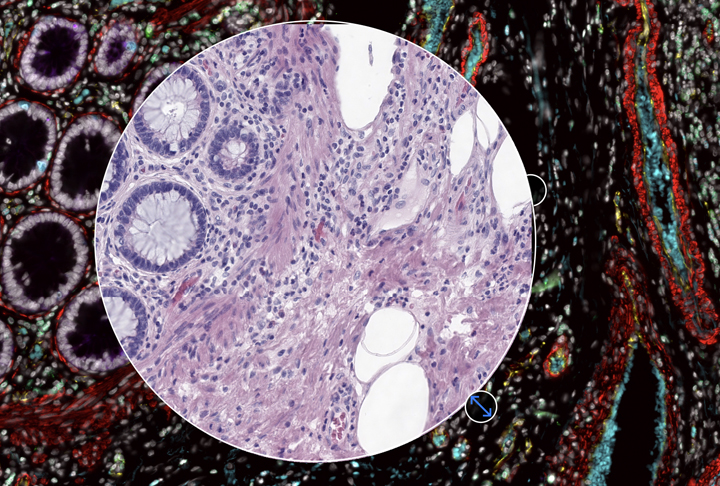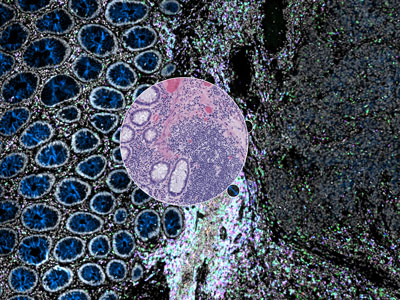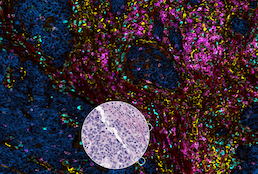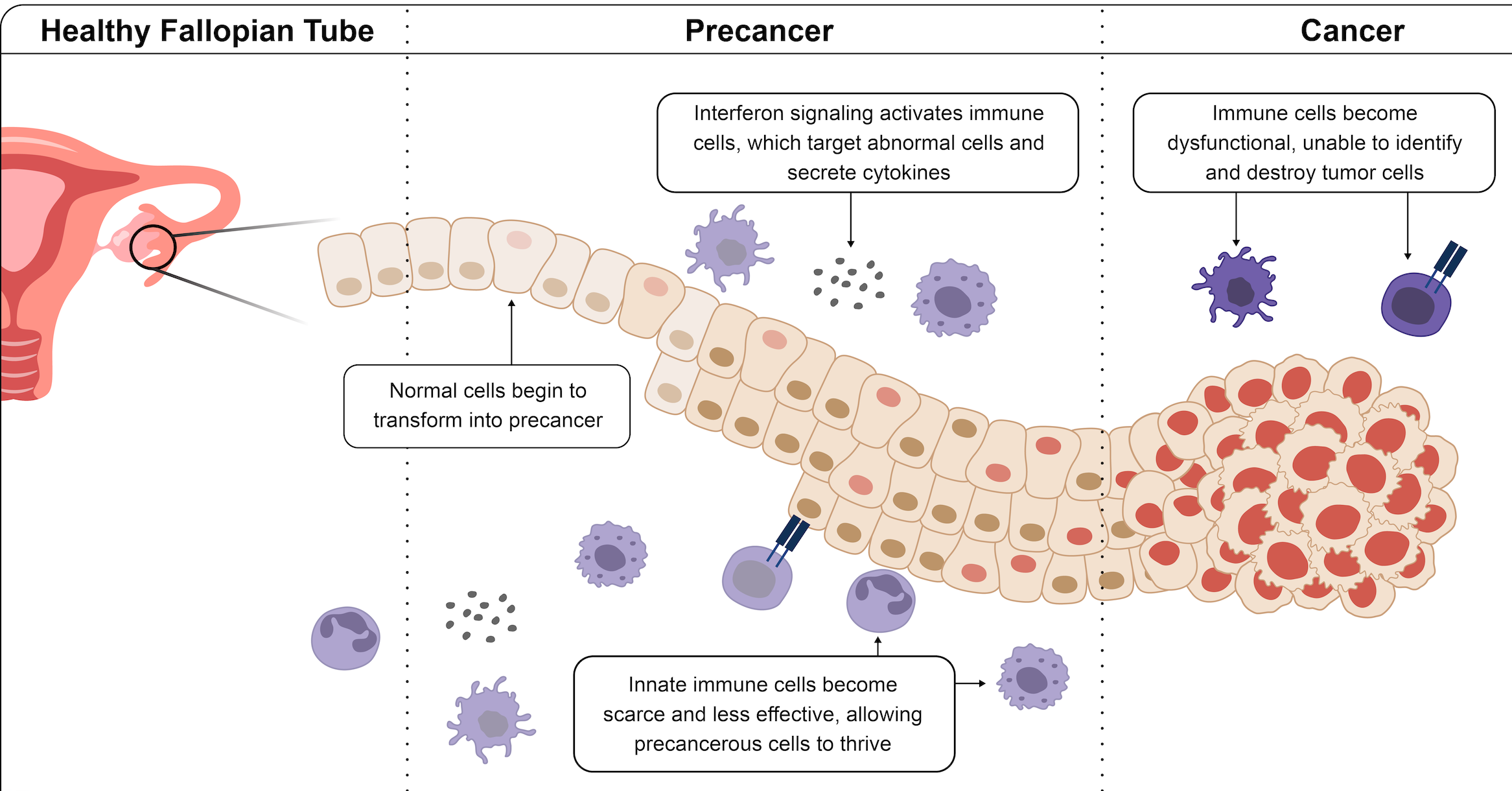Related Publications
2576724
IXMHRBF6
computational pathology
1
apa-cv
50
date
desc
1
1
4119
https://labsyspharm.org/wp-content/plugins/zotpress/
%7B%22status%22%3A%22success%22%2C%22updateneeded%22%3Afalse%2C%22instance%22%3Afalse%2C%22meta%22%3A%7B%22request_last%22%3A0%2C%22request_next%22%3A0%2C%22used_cache%22%3Atrue%7D%2C%22data%22%3A%5B%7B%22key%22%3A%22I8KVERLL%22%2C%22library%22%3A%7B%22id%22%3A2576724%7D%2C%22meta%22%3A%7B%22lastModifiedByUser%22%3A%7B%22id%22%3A5018704%2C%22username%22%3A%22AlyceChen%22%2C%22name%22%3A%22Alyce%20A%20Chen%22%2C%22links%22%3A%7B%22alternate%22%3A%7B%22href%22%3A%22https%3A%5C%2F%5C%2Fwww.zotero.org%5C%2Falycechen%22%2C%22type%22%3A%22text%5C%2Fhtml%22%7D%7D%7D%2C%22creatorSummary%22%3A%22Fang%20et%20al.%22%2C%22parsedDate%22%3A%222025-02-28%22%2C%22numChildren%22%3A2%7D%2C%22bib%22%3A%22%3Cdiv%20class%3D%5C%22csl-bib-body%5C%22%20style%3D%5C%22line-height%3A%202%3B%20padding-left%3A%201em%3B%20text-indent%3A-1em%3B%5C%22%3E%5Cn%20%20%3Cdiv%20class%3D%5C%22csl-entry%5C%22%3EFang%2C%20R.%2C%20Vallius%2C%20T.%2C%20Zhang%2C%20A.%2C%20Van%20Cura%2C%20D.%2C%20Alicandri%2C%20F.%2C%20Fischer%2C%20G.%2C%20Draper%2C%20E.%2C%20Xu%2C%20S.%2C%20Pelletier%2C%20R.%2C%20Wang%2C%20J.%2C%20Mandinova%2C%20A.%2C%20Katsyv%2C%20I.%2C%20Sorger%2C%20P.%20K.%2C%20Murphy%2C%20G.%20F.%2C%20%26amp%3B%20Lian%2C%20C.%20G.%20%282025%29.%20PRAME%20expression%20in%20melanoma%20is%20negatively%20regulated%20by%20TET2-mediated%20DNA%20hydroxymethylation.%20%3Ci%3ELaboratory%20Investigation%3B%20a%20Journal%20of%20Technical%20Methods%20and%20Pathology%3C%5C%2Fi%3E%2C%20104123.%20%3Ca%20class%3D%27zp-DOIURL%27%20target%3D%27_blank%27%20href%3D%27https%3A%5C%2F%5C%2Fdoi.org%5C%2F10.1016%5C%2Fj.labinv.2025.104123%27%3Ehttps%3A%5C%2F%5C%2Fdoi.org%5C%2F10.1016%5C%2Fj.labinv.2025.104123%3C%5C%2Fa%3E%3C%5C%2Fdiv%3E%5Cn%3C%5C%2Fdiv%3E%22%2C%22data%22%3A%7B%22itemType%22%3A%22journalArticle%22%2C%22title%22%3A%22PRAME%20expression%20in%20melanoma%20is%20negatively%20regulated%20by%20TET2-mediated%20DNA%20hydroxymethylation%22%2C%22creators%22%3A%5B%7B%22creatorType%22%3A%22author%22%2C%22firstName%22%3A%22Rui%22%2C%22lastName%22%3A%22Fang%22%7D%2C%7B%22creatorType%22%3A%22author%22%2C%22firstName%22%3A%22Tuulia%22%2C%22lastName%22%3A%22Vallius%22%7D%2C%7B%22creatorType%22%3A%22author%22%2C%22firstName%22%3A%22Arianna%22%2C%22lastName%22%3A%22Zhang%22%7D%2C%7B%22creatorType%22%3A%22author%22%2C%22firstName%22%3A%22Devon%22%2C%22lastName%22%3A%22Van%20Cura%22%7D%2C%7B%22creatorType%22%3A%22author%22%2C%22firstName%22%3A%22Francisco%22%2C%22lastName%22%3A%22Alicandri%22%7D%2C%7B%22creatorType%22%3A%22author%22%2C%22firstName%22%3A%22Grant%22%2C%22lastName%22%3A%22Fischer%22%7D%2C%7B%22creatorType%22%3A%22author%22%2C%22firstName%22%3A%22Elizabeth%22%2C%22lastName%22%3A%22Draper%22%7D%2C%7B%22creatorType%22%3A%22author%22%2C%22firstName%22%3A%22Shuyun%22%2C%22lastName%22%3A%22Xu%22%7D%2C%7B%22creatorType%22%3A%22author%22%2C%22firstName%22%3A%22Roxanne%22%2C%22lastName%22%3A%22Pelletier%22%7D%2C%7B%22creatorType%22%3A%22author%22%2C%22firstName%22%3A%22Justina%22%2C%22lastName%22%3A%22Wang%22%7D%2C%7B%22creatorType%22%3A%22author%22%2C%22firstName%22%3A%22Anna%22%2C%22lastName%22%3A%22Mandinova%22%7D%2C%7B%22creatorType%22%3A%22author%22%2C%22firstName%22%3A%22Igor%22%2C%22lastName%22%3A%22Katsyv%22%7D%2C%7B%22creatorType%22%3A%22author%22%2C%22firstName%22%3A%22Peter%20K.%22%2C%22lastName%22%3A%22Sorger%22%7D%2C%7B%22creatorType%22%3A%22author%22%2C%22firstName%22%3A%22George%20F.%22%2C%22lastName%22%3A%22Murphy%22%7D%2C%7B%22creatorType%22%3A%22author%22%2C%22firstName%22%3A%22Christine%20G.%22%2C%22lastName%22%3A%22Lian%22%7D%5D%2C%22abstractNote%22%3A%22Preferentially%20Expressed%20Antigen%20in%20Melanoma%20%28PRAME%29%20and%20Ten-Eleven%20Translocation%20%28TET%29%20dioxygenase-mediated%205-hydroxymethylcytosine%20%285hmC%29%20are%20emerging%20melanoma%20biomarkers.%20We%20observed%20an%20inverse%20correlation%20between%20PRAME%20expression%20and%205hmC%20levels%20in%20benign%20nevi%2C%20melanoma%20in%20situ%2C%20primary%20invasive%20melanoma%2C%20and%20metastatic%20melanomas%20via%20immunohistochemistry%20and%20multiplex%20immunofluorescence%3A%20nevi%20exhibited%20high%205hmC%20and%20low%20PRAME%2C%20whereas%20melanomas%20showed%20the%20opposite%20pattern.%20Single-cell%20multiplex%20imaging%20of%20melanoma%20precursors%20revealed%20that%20diminished%205hmC%20coincides%20with%20PRAME%20upregulation%20in%20premalignant%20cells.%20Analysis%20of%20TCGA%20and%20GTEx%20databases%20confirmed%20a%20negative%20relationship%20between%20TET2%20and%20PRAME%20mRNA%20expression%20in%20melanoma.%20Additionally%2C%205hmC%20levels%20were%20reduced%20at%20the%20PRAME%205%27%20promoter%20in%20melanoma%20compared%20to%20nevi%2C%20suggesting%20a%20role%20for%205hmC%20in%20PRAME%20transcription.%20Restoring%205hmC%20levels%20via%20TET2%20overexpression%20notably%20reduced%20PRAME%20expression%20in%20melanoma%20cell%20lines.%20These%20findings%20establish%20a%20function%20of%20TET2-mediated%20DNA%20hydroxymethylation%20in%20regulating%20PRAME%20expression%20and%20demonstrate%20epigenetic%20reprogramming%20as%20pivotal%20in%20melanoma%20tumorigenesis.%22%2C%22date%22%3A%222025-02-28%22%2C%22language%22%3A%22eng%22%2C%22DOI%22%3A%2210.1016%5C%2Fj.labinv.2025.104123%22%2C%22ISSN%22%3A%221530-0307%22%2C%22url%22%3A%22%22%2C%22collections%22%3A%5B%22IXMHRBF6%22%5D%2C%22dateModified%22%3A%222025-04-07T22%3A28%3A18Z%22%7D%7D%2C%7B%22key%22%3A%22AJSV43N4%22%2C%22library%22%3A%7B%22id%22%3A2576724%7D%2C%22meta%22%3A%7B%22creatorSummary%22%3A%22Kader%20et%20al.%22%2C%22parsedDate%22%3A%222024-12-20%22%2C%22numChildren%22%3A2%7D%2C%22bib%22%3A%22%3Cdiv%20class%3D%5C%22csl-bib-body%5C%22%20style%3D%5C%22line-height%3A%202%3B%20padding-left%3A%201em%3B%20text-indent%3A-1em%3B%5C%22%3E%5Cn%20%20%3Cdiv%20class%3D%5C%22csl-entry%5C%22%3EKader%2C%20T.%2C%20Lin%2C%20J.-R.%2C%20Hug%2C%20C.%20B.%2C%20Coy%2C%20S.%2C%20Chen%2C%20Y.-A.%2C%20de%20Bruijn%2C%20I.%2C%20Shih%2C%20N.%2C%20Jung%2C%20E.%2C%20Pelletier%2C%20R.%20J.%2C%20Lopez%20Leon%2C%20M.%2C%20Mingo%2C%20G.%2C%20Omran%2C%20D.%20K.%2C%20Lee%2C%20J.%20S.%2C%20Yapp%2C%20C.%2C%20Satravada%2C%20B.%20A.%2C%20Kundra%2C%20R.%2C%20Xu%2C%20Y.%2C%20Chan%2C%20S.%2C%20Tefft%2C%20J.%20B.%2C%20%26%23x2026%3B%20Santagata%2C%20S.%20%282024%29.%20Multimodal%20Spatial%20Profiling%20Reveals%20Immune%20Suppression%20and%20Microenvironment%20Remodeling%20in%20Fallopian%20Tube%20Precursors%20to%20High-Grade%20Serous%20Ovarian%20Carcinoma.%20%3Ci%3ECancer%20Discovery%3C%5C%2Fi%3E.%20%3Ca%20class%3D%27zp-DOIURL%27%20target%3D%27_blank%27%20href%3D%27https%3A%5C%2F%5C%2Fdoi.org%5C%2F10.1158%5C%2F2159-8290.CD-24-1366%27%3Ehttps%3A%5C%2F%5C%2Fdoi.org%5C%2F10.1158%5C%2F2159-8290.CD-24-1366%3C%5C%2Fa%3E%3C%5C%2Fdiv%3E%5Cn%3C%5C%2Fdiv%3E%22%2C%22data%22%3A%7B%22itemType%22%3A%22journalArticle%22%2C%22title%22%3A%22Multimodal%20Spatial%20Profiling%20Reveals%20Immune%20Suppression%20and%20Microenvironment%20Remodeling%20in%20Fallopian%20Tube%20Precursors%20to%20High-Grade%20Serous%20Ovarian%20Carcinoma%22%2C%22creators%22%3A%5B%7B%22creatorType%22%3A%22author%22%2C%22firstName%22%3A%22Tanjina%22%2C%22lastName%22%3A%22Kader%22%7D%2C%7B%22creatorType%22%3A%22author%22%2C%22firstName%22%3A%22Jia-Ren%22%2C%22lastName%22%3A%22Lin%22%7D%2C%7B%22creatorType%22%3A%22author%22%2C%22firstName%22%3A%22Clemens%20B.%22%2C%22lastName%22%3A%22Hug%22%7D%2C%7B%22creatorType%22%3A%22author%22%2C%22firstName%22%3A%22Shannon%22%2C%22lastName%22%3A%22Coy%22%7D%2C%7B%22creatorType%22%3A%22author%22%2C%22firstName%22%3A%22Yu-An%22%2C%22lastName%22%3A%22Chen%22%7D%2C%7B%22creatorType%22%3A%22author%22%2C%22firstName%22%3A%22Ino%22%2C%22lastName%22%3A%22de%20Bruijn%22%7D%2C%7B%22creatorType%22%3A%22author%22%2C%22firstName%22%3A%22Natalie%22%2C%22lastName%22%3A%22Shih%22%7D%2C%7B%22creatorType%22%3A%22author%22%2C%22firstName%22%3A%22Euihye%22%2C%22lastName%22%3A%22Jung%22%7D%2C%7B%22creatorType%22%3A%22author%22%2C%22firstName%22%3A%22Roxanne%20J.%22%2C%22lastName%22%3A%22Pelletier%22%7D%2C%7B%22creatorType%22%3A%22author%22%2C%22firstName%22%3A%22Mariana%22%2C%22lastName%22%3A%22Lopez%20Leon%22%7D%2C%7B%22creatorType%22%3A%22author%22%2C%22firstName%22%3A%22Gabriel%22%2C%22lastName%22%3A%22Mingo%22%7D%2C%7B%22creatorType%22%3A%22author%22%2C%22firstName%22%3A%22Dalia%20K.%22%2C%22lastName%22%3A%22Omran%22%7D%2C%7B%22creatorType%22%3A%22author%22%2C%22firstName%22%3A%22Jong%20Suk%22%2C%22lastName%22%3A%22Lee%22%7D%2C%7B%22creatorType%22%3A%22author%22%2C%22firstName%22%3A%22Clarence%22%2C%22lastName%22%3A%22Yapp%22%7D%2C%7B%22creatorType%22%3A%22author%22%2C%22firstName%22%3A%22Baby%20A.%22%2C%22lastName%22%3A%22Satravada%22%7D%2C%7B%22creatorType%22%3A%22author%22%2C%22firstName%22%3A%22Ritika%22%2C%22lastName%22%3A%22Kundra%22%7D%2C%7B%22creatorType%22%3A%22author%22%2C%22firstName%22%3A%22Yilin%22%2C%22lastName%22%3A%22Xu%22%7D%2C%7B%22creatorType%22%3A%22author%22%2C%22firstName%22%3A%22Sabrina%22%2C%22lastName%22%3A%22Chan%22%7D%2C%7B%22creatorType%22%3A%22author%22%2C%22firstName%22%3A%22Juliann%20B.%22%2C%22lastName%22%3A%22Tefft%22%7D%2C%7B%22creatorType%22%3A%22author%22%2C%22firstName%22%3A%22Jeremy%20L.%22%2C%22lastName%22%3A%22Muhlich%22%7D%2C%7B%22creatorType%22%3A%22author%22%2C%22firstName%22%3A%22Sarah%20H.%22%2C%22lastName%22%3A%22Kim%22%7D%2C%7B%22creatorType%22%3A%22author%22%2C%22firstName%22%3A%22Stefan%20M.%22%2C%22lastName%22%3A%22Gysler%22%7D%2C%7B%22creatorType%22%3A%22author%22%2C%22firstName%22%3A%22Judith%22%2C%22lastName%22%3A%22Agudo%22%7D%2C%7B%22creatorType%22%3A%22author%22%2C%22firstName%22%3A%22James%20R.%22%2C%22lastName%22%3A%22Heath%22%7D%2C%7B%22creatorType%22%3A%22author%22%2C%22firstName%22%3A%22Nikolaus%22%2C%22lastName%22%3A%22Schultz%22%7D%2C%7B%22creatorType%22%3A%22author%22%2C%22firstName%22%3A%22Charles%20W.%22%2C%22lastName%22%3A%22Drescher%22%7D%2C%7B%22creatorType%22%3A%22author%22%2C%22firstName%22%3A%22Peter%20K.%22%2C%22lastName%22%3A%22Sorger%22%7D%2C%7B%22creatorType%22%3A%22author%22%2C%22firstName%22%3A%22Ronny%22%2C%22lastName%22%3A%22Drapkin%22%7D%2C%7B%22creatorType%22%3A%22author%22%2C%22firstName%22%3A%22Sandro%22%2C%22lastName%22%3A%22Santagata%22%7D%5D%2C%22abstractNote%22%3A%22High-Grade%20Serous%20Ovarian%20Cancer%20%28HGSOC%29%20originates%20from%20fallopian%20tube%20%28FT%29%20precursors.%20However%2C%20the%20molecular%20changes%20that%20occur%20as%20precancerous%20lesions%20progress%20to%20HGSOC%20are%20not%20well%20understood.%20To%20address%20this%2C%20we%20integrated%20high-plex%20imaging%20and%20spatial%20transcriptomics%20to%20analyze%20human%20tissue%20samples%20at%20different%20stages%20of%20HGSOC%20development%2C%20including%20p53%20signatures%2C%20serous%20tubal%20intraepithelial%20carcinomas%20%28STIC%29%2C%20and%20invasive%20HGSOC.%20Our%20findings%20reveal%20immune%20modulating%20mechanisms%20within%20precursor%20epithelium%2C%20characterized%20by%20chromosomal%20instability%2C%20persistent%20interferon%20%28IFN%29%20signaling%2C%20and%20dysregulated%20innate%20and%20adaptive%20immunity.%20FT%20precursors%20display%20elevated%20expression%20of%20MHC-class%20I%2C%20including%20HLA-E%2C%20and%20IFN-stimulated%20genes%2C%20typically%20linked%20to%20later-stage%20tumorigenesis.%20These%20molecular%20alterations%20coincide%20with%20progressive%20shifts%20in%20the%20tumor%20microenvironment%2C%20transitioning%20from%20immune%20surveillance%20in%20early%20STICs%20to%20immune%20suppression%20in%20advanced%20STICs%20and%20cancer.%20These%20insights%20identify%20potential%20biomarkers%20and%20therapeutic%20targets%20for%20HGSOC%20interception%20and%20clarify%20the%20molecular%20transitions%20from%20precancer%20to%20cancer.%22%2C%22date%22%3A%222024-12-20%22%2C%22language%22%3A%22eng%22%2C%22DOI%22%3A%2210.1158%5C%2F2159-8290.CD-24-1366%22%2C%22ISSN%22%3A%222159-8290%22%2C%22url%22%3A%22%22%2C%22collections%22%3A%5B%22IXMHRBF6%22%5D%2C%22dateModified%22%3A%222025-01-28T21%3A21%3A09Z%22%7D%7D%2C%7B%22key%22%3A%229LABQV53%22%2C%22library%22%3A%7B%22id%22%3A2576724%7D%2C%22meta%22%3A%7B%22lastModifiedByUser%22%3A%7B%22id%22%3A5018704%2C%22username%22%3A%22AlyceChen%22%2C%22name%22%3A%22Alyce%20A%20Chen%22%2C%22links%22%3A%7B%22alternate%22%3A%7B%22href%22%3A%22https%3A%5C%2F%5C%2Fwww.zotero.org%5C%2Falycechen%22%2C%22type%22%3A%22text%5C%2Fhtml%22%7D%7D%7D%2C%22creatorSummary%22%3A%22Wala%20et%20al.%22%2C%22parsedDate%22%3A%222024-09-26%22%2C%22numChildren%22%3A1%7D%2C%22bib%22%3A%22%3Cdiv%20class%3D%5C%22csl-bib-body%5C%22%20style%3D%5C%22line-height%3A%202%3B%20padding-left%3A%201em%3B%20text-indent%3A-1em%3B%5C%22%3E%5Cn%20%20%3Cdiv%20class%3D%5C%22csl-entry%5C%22%3EWala%2C%20J.%2C%20de%20Bruijn%2C%20I.%2C%20Coy%2C%20S.%2C%20Gagn%26%23xE9%3B%2C%20A.%2C%20Chan%2C%20S.%2C%20Chen%2C%20Y.-A.%2C%20Hoffer%2C%20J.%2C%20Muhlich%2C%20J.%2C%20Schultz%2C%20N.%2C%20Santagata%2C%20S.%2C%20%26amp%3B%20Sorger%2C%20P.%20K.%20%282024%29.%20%3Ci%3EIntegrating%20spatial%20profiles%20and%20cancer%20genomics%20to%20identify%20immune-infiltrated%20mismatch%20repair%20proficient%20colorectal%20cancers%3C%5C%2Fi%3E%20%5BPreprint%5D.%20bioRxiv.%20%3Ca%20class%3D%27zp-DOIURL%27%20target%3D%27_blank%27%20href%3D%27https%3A%5C%2F%5C%2Fdoi.org%5C%2F10.1101%5C%2F2024.09.24.614701%27%3Ehttps%3A%5C%2F%5C%2Fdoi.org%5C%2F10.1101%5C%2F2024.09.24.614701%3C%5C%2Fa%3E%3C%5C%2Fdiv%3E%5Cn%3C%5C%2Fdiv%3E%22%2C%22data%22%3A%7B%22itemType%22%3A%22preprint%22%2C%22title%22%3A%22Integrating%20spatial%20profiles%20and%20cancer%20genomics%20to%20identify%20immune-infiltrated%20mismatch%20repair%20proficient%20colorectal%20cancers%22%2C%22creators%22%3A%5B%7B%22creatorType%22%3A%22author%22%2C%22firstName%22%3A%22Jeremiah%22%2C%22lastName%22%3A%22Wala%22%7D%2C%7B%22creatorType%22%3A%22author%22%2C%22firstName%22%3A%22Ino%22%2C%22lastName%22%3A%22de%20Bruijn%22%7D%2C%7B%22creatorType%22%3A%22author%22%2C%22firstName%22%3A%22Shannon%22%2C%22lastName%22%3A%22Coy%22%7D%2C%7B%22creatorType%22%3A%22author%22%2C%22firstName%22%3A%22Andr%5Cu00e9anne%22%2C%22lastName%22%3A%22Gagn%5Cu00e9%22%7D%2C%7B%22creatorType%22%3A%22author%22%2C%22firstName%22%3A%22Sabrina%22%2C%22lastName%22%3A%22Chan%22%7D%2C%7B%22creatorType%22%3A%22author%22%2C%22firstName%22%3A%22Yu-An%22%2C%22lastName%22%3A%22Chen%22%7D%2C%7B%22creatorType%22%3A%22author%22%2C%22firstName%22%3A%22John%22%2C%22lastName%22%3A%22Hoffer%22%7D%2C%7B%22creatorType%22%3A%22author%22%2C%22firstName%22%3A%22Jeremy%22%2C%22lastName%22%3A%22Muhlich%22%7D%2C%7B%22creatorType%22%3A%22author%22%2C%22firstName%22%3A%22Nikolaus%22%2C%22lastName%22%3A%22Schultz%22%7D%2C%7B%22creatorType%22%3A%22author%22%2C%22firstName%22%3A%22Sandro%22%2C%22lastName%22%3A%22Santagata%22%7D%2C%7B%22creatorType%22%3A%22author%22%2C%22firstName%22%3A%22Peter%20K.%22%2C%22lastName%22%3A%22Sorger%22%7D%5D%2C%22abstractNote%22%3A%22Predicting%20the%20progression%20of%20solid%20cancers%20based%20solely%20on%20genetics%20is%20challenging%20due%20to%20the%20influence%20of%20the%20tumor%20microenvironment%20%28TME%29.%20For%20colorectal%20cancer%20%28CRC%29%2C%20tumors%20deficient%20in%20mismatch%20repair%20%28dMMR%29%20are%20more%20immune%20infiltrated%20than%20mismatch%20repair%20proficient%20%28pMMR%29%20tumors%20and%20have%20better%20prognosis%20following%20resection.%20Here%20we%20quantify%20features%20of%20the%20CRC%20TME%20by%20combining%20spatial%20profiling%20with%20genetic%20analysis%20and%20release%20our%20findings%20via%20a%20spatially%20enhanced%20version%20of%20cBioPortal%20that%20facilitates%20multi-modal%20data%20exploration%20and%20analysis.%20We%20find%20that%20%5Cu223c20%25%20of%20pMMR%20tumors%20exhibit%20similar%20levels%20of%20T%20cell%20infiltration%20as%20dMMR%20tumors%20and%20that%20this%20is%20associated%20with%20better%20survival%20but%20not%20any%20specific%20somatic%20mutation.%20These%20T%20cell-infiltrated%20pMMR%20%28tipMMR%29%20tumors%20contain%20abundant%20cells%20expressing%20PD1%20and%20PDL1%20as%20well%20as%20T%20regulatory%20cells%2C%20consistent%20with%20a%20suppressed%20immune%20response.%20Thus%2C%20like%20dMMR%20CRC%2C%20tipMMR%20CRC%20may%20benefit%20from%20immune%20checkpoint%20inhibitor%20therapy.%5CnSIGNIFICANCE%3A%20pMMR%20tumors%20with%20high%20T%20cell%20infiltration%20and%20active%20immunosuppression%20are%20identifiable%20with%20a%20mid-plex%20imaging%20assay%20whose%20clinical%20deployment%20might%20double%20the%20number%20of%20treatment-na%5Cu00efve%20CRCs%20eligible%20for%20ICIs.%20Moreover%2C%20the%20low%20tumor%20mutational%20burden%20in%20tipMMR%20CRC%20shows%20that%20MMR%20status%20is%20not%20the%20only%20factor%20promoting%20immune%20infiltration.%22%2C%22genre%22%3A%22preprint%22%2C%22repository%22%3A%22bioRxiv%22%2C%22archiveID%22%3A%22%22%2C%22date%22%3A%222024-09-26%22%2C%22DOI%22%3A%2210.1101%5C%2F2024.09.24.614701%22%2C%22citationKey%22%3A%22%22%2C%22url%22%3A%22%22%2C%22language%22%3A%22eng%22%2C%22collections%22%3A%5B%22IXMHRBF6%22%5D%2C%22dateModified%22%3A%222025-04-07T22%3A47%3A35Z%22%7D%7D%2C%7B%22key%22%3A%223MMFBXRT%22%2C%22library%22%3A%7B%22id%22%3A2576724%7D%2C%22meta%22%3A%7B%22creatorSummary%22%3A%22Ricciuti%20et%20al.%22%2C%22parsedDate%22%3A%222024-04-10%22%2C%22numChildren%22%3A1%7D%2C%22bib%22%3A%22%3Cdiv%20class%3D%5C%22csl-bib-body%5C%22%20style%3D%5C%22line-height%3A%202%3B%20padding-left%3A%201em%3B%20text-indent%3A-1em%3B%5C%22%3E%5Cn%20%20%3Cdiv%20class%3D%5C%22csl-entry%5C%22%3ERicciuti%2C%20B.%2C%20Lamberti%2C%20G.%2C%20Puchala%2C%20S.%20R.%2C%20Mahadevan%2C%20N.%20R.%2C%20Lin%2C%20J.-R.%2C%20Alessi%2C%20J.%20V.%2C%20Chowdhury%2C%20A.%2C%20Li%2C%20Y.%20Y.%2C%20Wang%2C%20X.%2C%20Spurr%2C%20L.%2C%20Pecci%2C%20F.%2C%20Di%20Federico%2C%20A.%2C%20Venkatraman%2C%20D.%2C%20Barrichello%2C%20A.%20P.%2C%20Gandhi%2C%20M.%2C%20Vaz%2C%20V.%20R.%2C%20Pangilinan%2C%20A.%20J.%2C%20Haradon%2C%20D.%2C%20Lee%2C%20E.%2C%20%26%23x2026%3B%20Awad%2C%20M.%20M.%20%282024%29.%20Genomic%20and%20Immunophenotypic%20Landscape%20of%20Acquired%20Resistance%20to%20PD-%28L%291%20Blockade%20in%20Non-Small-Cell%20Lung%20Cancer.%20%3Ci%3EJournal%20of%20Clinical%20Oncology%3A%20Official%20Journal%20of%20the%20American%20Society%20of%20Clinical%20Oncology%3C%5C%2Fi%3E%2C%20%3Ci%3E42%3C%5C%2Fi%3E%2811%29%2C%201311%26%23x2013%3B1321.%20%3Ca%20class%3D%27zp-DOIURL%27%20target%3D%27_blank%27%20href%3D%27https%3A%5C%2F%5C%2Fdoi.org%5C%2F10.1200%5C%2FJCO.23.00580%27%3Ehttps%3A%5C%2F%5C%2Fdoi.org%5C%2F10.1200%5C%2FJCO.23.00580%3C%5C%2Fa%3E%3C%5C%2Fdiv%3E%5Cn%3C%5C%2Fdiv%3E%22%2C%22data%22%3A%7B%22itemType%22%3A%22journalArticle%22%2C%22title%22%3A%22Genomic%20and%20Immunophenotypic%20Landscape%20of%20Acquired%20Resistance%20to%20PD-%28L%291%20Blockade%20in%20Non-Small-Cell%20Lung%20Cancer%22%2C%22creators%22%3A%5B%7B%22creatorType%22%3A%22author%22%2C%22firstName%22%3A%22Biagio%22%2C%22lastName%22%3A%22Ricciuti%22%7D%2C%7B%22creatorType%22%3A%22author%22%2C%22firstName%22%3A%22Giuseppe%22%2C%22lastName%22%3A%22Lamberti%22%7D%2C%7B%22creatorType%22%3A%22author%22%2C%22firstName%22%3A%22Sreekar%20R.%22%2C%22lastName%22%3A%22Puchala%22%7D%2C%7B%22creatorType%22%3A%22author%22%2C%22firstName%22%3A%22Navin%20R.%22%2C%22lastName%22%3A%22Mahadevan%22%7D%2C%7B%22creatorType%22%3A%22author%22%2C%22firstName%22%3A%22Jia-Ren%22%2C%22lastName%22%3A%22Lin%22%7D%2C%7B%22creatorType%22%3A%22author%22%2C%22firstName%22%3A%22Joao%20V.%22%2C%22lastName%22%3A%22Alessi%22%7D%2C%7B%22creatorType%22%3A%22author%22%2C%22firstName%22%3A%22Alexander%22%2C%22lastName%22%3A%22Chowdhury%22%7D%2C%7B%22creatorType%22%3A%22author%22%2C%22firstName%22%3A%22Yvonne%20Y.%22%2C%22lastName%22%3A%22Li%22%7D%2C%7B%22creatorType%22%3A%22author%22%2C%22firstName%22%3A%22Xinan%22%2C%22lastName%22%3A%22Wang%22%7D%2C%7B%22creatorType%22%3A%22author%22%2C%22firstName%22%3A%22Liam%22%2C%22lastName%22%3A%22Spurr%22%7D%2C%7B%22creatorType%22%3A%22author%22%2C%22firstName%22%3A%22Federica%22%2C%22lastName%22%3A%22Pecci%22%7D%2C%7B%22creatorType%22%3A%22author%22%2C%22firstName%22%3A%22Alessandro%22%2C%22lastName%22%3A%22Di%20Federico%22%7D%2C%7B%22creatorType%22%3A%22author%22%2C%22firstName%22%3A%22Deepti%22%2C%22lastName%22%3A%22Venkatraman%22%7D%2C%7B%22creatorType%22%3A%22author%22%2C%22firstName%22%3A%22Adriana%20P.%22%2C%22lastName%22%3A%22Barrichello%22%7D%2C%7B%22creatorType%22%3A%22author%22%2C%22firstName%22%3A%22Malini%22%2C%22lastName%22%3A%22Gandhi%22%7D%2C%7B%22creatorType%22%3A%22author%22%2C%22firstName%22%3A%22Victor%20R.%22%2C%22lastName%22%3A%22Vaz%22%7D%2C%7B%22creatorType%22%3A%22author%22%2C%22firstName%22%3A%22Andy%20J.%22%2C%22lastName%22%3A%22Pangilinan%22%7D%2C%7B%22creatorType%22%3A%22author%22%2C%22firstName%22%3A%22Danielle%22%2C%22lastName%22%3A%22Haradon%22%7D%2C%7B%22creatorType%22%3A%22author%22%2C%22firstName%22%3A%22Elinton%22%2C%22lastName%22%3A%22Lee%22%7D%2C%7B%22creatorType%22%3A%22author%22%2C%22firstName%22%3A%22Hersh%22%2C%22lastName%22%3A%22Gupta%22%7D%2C%7B%22creatorType%22%3A%22author%22%2C%22firstName%22%3A%22Kathleen%20L.%22%2C%22lastName%22%3A%22Pfaff%22%7D%2C%7B%22creatorType%22%3A%22author%22%2C%22firstName%22%3A%22Emma%20L.%22%2C%22lastName%22%3A%22Welsh%22%7D%2C%7B%22creatorType%22%3A%22author%22%2C%22firstName%22%3A%22Mizuki%22%2C%22lastName%22%3A%22Nishino%22%7D%2C%7B%22creatorType%22%3A%22author%22%2C%22firstName%22%3A%22Andrew%20D.%22%2C%22lastName%22%3A%22Cherniack%22%7D%2C%7B%22creatorType%22%3A%22author%22%2C%22firstName%22%3A%22Bruce%20E.%22%2C%22lastName%22%3A%22Johnson%22%7D%2C%7B%22creatorType%22%3A%22author%22%2C%22firstName%22%3A%22Jason%20L.%22%2C%22lastName%22%3A%22Weirather%22%7D%2C%7B%22creatorType%22%3A%22author%22%2C%22firstName%22%3A%22Ian%20D.%22%2C%22lastName%22%3A%22Dryg%22%7D%2C%7B%22creatorType%22%3A%22author%22%2C%22firstName%22%3A%22Scott%20J.%22%2C%22lastName%22%3A%22Rodig%22%7D%2C%7B%22creatorType%22%3A%22author%22%2C%22firstName%22%3A%22Lynette%20M.%22%2C%22lastName%22%3A%22Sholl%22%7D%2C%7B%22creatorType%22%3A%22author%22%2C%22firstName%22%3A%22Peter%22%2C%22lastName%22%3A%22Sorger%22%7D%2C%7B%22creatorType%22%3A%22author%22%2C%22firstName%22%3A%22Sandro%22%2C%22lastName%22%3A%22Santagata%22%7D%2C%7B%22creatorType%22%3A%22author%22%2C%22firstName%22%3A%22Renato%22%2C%22lastName%22%3A%22Umeton%22%7D%2C%7B%22creatorType%22%3A%22author%22%2C%22firstName%22%3A%22Mark%20M.%22%2C%22lastName%22%3A%22Awad%22%7D%5D%2C%22abstractNote%22%3A%22PURPOSE%3A%20Although%20immune%20checkpoint%20inhibitors%20%28ICI%29%20have%20extended%20survival%20in%20patients%20with%20non-small-cell%20lung%20cancer%20%28NSCLC%29%2C%20acquired%20resistance%20%28AR%29%20to%20ICI%20frequently%20develops%20after%20an%20initial%20benefit.%20However%2C%20the%20mechanisms%20of%20AR%20to%20ICI%20in%20NSCLC%20are%20largely%20unknown.%5CnMETHODS%3A%20Comprehensive%20tumor%20genomic%20profiling%2C%20machine%20learning-based%20assessment%20of%20tumor-infiltrating%20lymphocytes%2C%20multiplexed%20immunofluorescence%2C%20and%5C%2For%20HLA-I%20immunohistochemistry%20%28IHC%29%20were%20performed%20on%20matched%20pre-%20and%20post-ICI%20tumor%20biopsies%20from%20patients%20with%20NSCLC%20treated%20with%20ICI%20at%20the%20Dana-Farber%20Cancer%20Institute%20who%20developed%20AR%20to%20ICI.%20Two%20additional%20cohorts%20of%20patients%20with%20intervening%20chemotherapy%20or%20targeted%20therapies%20between%20biopsies%20were%20included%20as%20controls.%5CnRESULTS%3A%20We%20performed%20comprehensive%20genomic%20profiling%20and%20immunophenotypic%20characterization%20on%20samples%20from%2082%20patients%20with%20NSCLC%20and%20matched%20pre-%20and%20post-ICI%20biopsies%20and%20compared%20findings%20with%20a%20control%20cohort%20of%20patients%20with%20non-ICI%20intervening%20therapies%20between%20biopsies%20%28chemotherapy%2C%20N%20%3D%2032%3B%20targeted%20therapies%2C%20N%20%3D%2089%3B%20both%2C%20N%20%3D%2017%29.%20Putative%20resistance%20mutations%20were%20identified%20in%2027.8%25%20of%20immunotherapy-treated%20cases%20and%20included%20acquired%20loss-of-function%20mutations%20in%20STK11%2C%20B2M%2C%20APC%2C%20MTOR%2C%20KEAP1%2C%20and%20JAK1%5C%2F2%3B%20these%20acquired%20alterations%20were%20not%20observed%20in%20the%20control%20groups.%20Immunophenotyping%20of%20matched%20pre-%20and%20post-ICI%20samples%20demonstrated%20significant%20decreases%20in%20intratumoral%20lymphocytes%2C%20CD3e%2B%20and%20CD8a%2B%20T%20cells%2C%20and%20PD-L1-PD1%20engagement%2C%20as%20well%20as%20increased%20distance%20between%20tumor%20cells%20and%20CD8%2BPD-1%2B%20T%20cells.%20There%20was%20a%20significant%20decrease%20in%20HLA%20class%20I%20expression%20in%20the%20immunotherapy%20cohort%20at%20the%20time%20of%20AR%20compared%20with%20the%20chemotherapy%20%28P%20%3D%20.005%29%20and%20the%20targeted%20therapy%20%28P%20%3D%20.01%29%20cohorts.%5CnCONCLUSION%3A%20These%20findings%20highlight%20the%20genomic%20and%20immunophenotypic%20heterogeneity%20of%20ICI%20resistance%20in%20NSCLC%2C%20which%20will%20need%20to%20be%20considered%20when%20developing%20novel%20therapeutic%20strategies%20aimed%20at%20overcoming%20resistance.%22%2C%22date%22%3A%222024-04-10%22%2C%22language%22%3A%22eng%22%2C%22DOI%22%3A%2210.1200%5C%2FJCO.23.00580%22%2C%22ISSN%22%3A%221527-7755%22%2C%22url%22%3A%22%22%2C%22collections%22%3A%5B%22IXMHRBF6%22%5D%2C%22dateModified%22%3A%222024-11-04T20%3A19%3A45Z%22%7D%7D%2C%7B%22key%22%3A%22AKCGA5KT%22%2C%22library%22%3A%7B%22id%22%3A2576724%7D%2C%22meta%22%3A%7B%22lastModifiedByUser%22%3A%7B%22id%22%3A5018704%2C%22username%22%3A%22AlyceChen%22%2C%22name%22%3A%22Alyce%20A%20Chen%22%2C%22links%22%3A%7B%22alternate%22%3A%7B%22href%22%3A%22https%3A%5C%2F%5C%2Fwww.zotero.org%5C%2Falycechen%22%2C%22type%22%3A%22text%5C%2Fhtml%22%7D%7D%7D%2C%22creatorSummary%22%3A%22Coy%20et%20al.%22%2C%22parsedDate%22%3A%222023-11-11%22%2C%22numChildren%22%3A2%7D%2C%22bib%22%3A%22%3Cdiv%20class%3D%5C%22csl-bib-body%5C%22%20style%3D%5C%22line-height%3A%202%3B%20padding-left%3A%201em%3B%20text-indent%3A-1em%3B%5C%22%3E%5Cn%20%20%3Cdiv%20class%3D%5C%22csl-entry%5C%22%3ECoy%2C%20S.%2C%20Cheng%2C%20B.%2C%20Lee%2C%20J.%20S.%2C%20Rashid%2C%20R.%2C%20Browning%2C%20L.%2C%20Xu%2C%20Y.%2C%20Chakrabarty%2C%20S.%20S.%2C%20Yapp%2C%20C.%2C%20Chan%2C%20S.%2C%20Tefft%2C%20J.%20B.%2C%20Scott%2C%20E.%2C%20Spektor%2C%20A.%2C%20Ligon%2C%20K.%20L.%2C%20Baker%2C%20G.%20J.%2C%20Pellman%2C%20D.%2C%20Sorger%2C%20P.%20K.%2C%20%26amp%3B%20Santagata%2C%20S.%20%282023%29.%20%3Ci%3E2D%20and%203D%20multiplexed%20subcellular%20profiling%20of%20nuclear%20instability%20in%20human%20cancer%3C%5C%2Fi%3E%20%5BPreprint%5D.%20bioRxiv.%20%3Ca%20class%3D%27zp-DOIURL%27%20target%3D%27_blank%27%20href%3D%27https%3A%5C%2F%5C%2Fdoi.org%5C%2F10.1101%5C%2F2023.11.07.566063%27%3Ehttps%3A%5C%2F%5C%2Fdoi.org%5C%2F10.1101%5C%2F2023.11.07.566063%3C%5C%2Fa%3E%3C%5C%2Fdiv%3E%5Cn%3C%5C%2Fdiv%3E%22%2C%22data%22%3A%7B%22itemType%22%3A%22preprint%22%2C%22title%22%3A%222D%20and%203D%20multiplexed%20subcellular%20profiling%20of%20nuclear%20instability%20in%20human%20cancer%22%2C%22creators%22%3A%5B%7B%22creatorType%22%3A%22author%22%2C%22firstName%22%3A%22Shannon%22%2C%22lastName%22%3A%22Coy%22%7D%2C%7B%22creatorType%22%3A%22author%22%2C%22firstName%22%3A%22Brian%22%2C%22lastName%22%3A%22Cheng%22%7D%2C%7B%22creatorType%22%3A%22author%22%2C%22firstName%22%3A%22Jong%20Suk%22%2C%22lastName%22%3A%22Lee%22%7D%2C%7B%22creatorType%22%3A%22author%22%2C%22firstName%22%3A%22Rumana%22%2C%22lastName%22%3A%22Rashid%22%7D%2C%7B%22creatorType%22%3A%22author%22%2C%22firstName%22%3A%22Lindsay%22%2C%22lastName%22%3A%22Browning%22%7D%2C%7B%22creatorType%22%3A%22author%22%2C%22firstName%22%3A%22Yilin%22%2C%22lastName%22%3A%22Xu%22%7D%2C%7B%22creatorType%22%3A%22author%22%2C%22firstName%22%3A%22Sankha%20S.%22%2C%22lastName%22%3A%22Chakrabarty%22%7D%2C%7B%22creatorType%22%3A%22author%22%2C%22firstName%22%3A%22Clarence%22%2C%22lastName%22%3A%22Yapp%22%7D%2C%7B%22creatorType%22%3A%22author%22%2C%22firstName%22%3A%22Sabrina%22%2C%22lastName%22%3A%22Chan%22%7D%2C%7B%22creatorType%22%3A%22author%22%2C%22firstName%22%3A%22Juliann%20B.%22%2C%22lastName%22%3A%22Tefft%22%7D%2C%7B%22creatorType%22%3A%22author%22%2C%22firstName%22%3A%22Emily%22%2C%22lastName%22%3A%22Scott%22%7D%2C%7B%22creatorType%22%3A%22author%22%2C%22firstName%22%3A%22Alexander%22%2C%22lastName%22%3A%22Spektor%22%7D%2C%7B%22creatorType%22%3A%22author%22%2C%22firstName%22%3A%22Keith%20L.%22%2C%22lastName%22%3A%22Ligon%22%7D%2C%7B%22creatorType%22%3A%22author%22%2C%22firstName%22%3A%22Gregory%20J.%22%2C%22lastName%22%3A%22Baker%22%7D%2C%7B%22creatorType%22%3A%22author%22%2C%22firstName%22%3A%22David%22%2C%22lastName%22%3A%22Pellman%22%7D%2C%7B%22creatorType%22%3A%22author%22%2C%22firstName%22%3A%22Peter%20K.%22%2C%22lastName%22%3A%22Sorger%22%7D%2C%7B%22creatorType%22%3A%22author%22%2C%22firstName%22%3A%22Sandro%22%2C%22lastName%22%3A%22Santagata%22%7D%5D%2C%22abstractNote%22%3A%22Nuclear%20atypia%2C%20including%20altered%20nuclear%20size%2C%20contour%2C%20and%20chromatin%20organization%2C%20is%20ubiquitous%20in%20cancer%20cells.%20Atypical%20primary%20nuclei%20and%20micronuclei%20can%20rupture%20during%20interphase%3B%20however%2C%20the%20frequency%2C%20causes%2C%20and%20consequences%20of%20nuclear%20rupture%20are%20unknown%20in%20most%20cancers.%20We%20demonstrate%20that%20nuclear%20envelope%20rupture%20is%20surprisingly%20common%20in%20many%20human%20cancers%2C%20particularly%20glioblastoma.%20Using%20highly-multiplexed%202D%20and%20super-resolution%203D-imaging%20of%20glioblastoma%20tissues%20and%20patient-derived%20xenografts%20and%20cells%2C%20we%20link%20primary%20nuclear%20rupture%20with%20reduced%20lamin%20A%5C%2FC%20and%20micronuclear%20rupture%20with%20reduced%20lamin%20B1.%20Moreover%2C%20ruptured%20glioblastoma%20cells%20activate%20cGAS-STING-signaling%20involved%20in%20innate%20immunity.%20We%20observe%20that%20local%20patterning%20of%20cell%20states%20influences%20tumor%20spatial%20organization%20and%20is%20linked%20to%20both%20lamin%20expression%20and%20rupture%20frequency%2C%20with%20neural-progenitor-cell-like%20states%20exhibiting%20the%20lowest%20lamin%20A%5C%2FC%20levels%20and%20greatest%20susceptibility%20to%20primary%20nuclear%20rupture.%20Our%20study%20reveals%20that%20nuclear%20instability%20is%20a%20core%20feature%20of%20cancer%2C%20and%20links%20nuclear%20integrity%2C%20cell%20state%2C%20and%20immune%20signaling.%22%2C%22genre%22%3A%22preprint%22%2C%22repository%22%3A%22bioRxiv%22%2C%22archiveID%22%3A%22%22%2C%22date%22%3A%222023-11-11%22%2C%22DOI%22%3A%2210.1101%5C%2F2023.11.07.566063%22%2C%22citationKey%22%3A%22%22%2C%22url%22%3A%22%22%2C%22language%22%3A%22eng%22%2C%22collections%22%3A%5B%22IXMHRBF6%22%5D%2C%22dateModified%22%3A%222025-04-07T22%3A57%3A08Z%22%7D%7D%2C%7B%22key%22%3A%22P742XUPD%22%2C%22library%22%3A%7B%22id%22%3A2576724%7D%2C%22meta%22%3A%7B%22lastModifiedByUser%22%3A%7B%22id%22%3A9036456%2C%22username%22%3A%22jtefft%22%2C%22name%22%3A%22%22%2C%22links%22%3A%7B%22alternate%22%3A%7B%22href%22%3A%22https%3A%5C%2F%5C%2Fwww.zotero.org%5C%2Fjtefft%22%2C%22type%22%3A%22text%5C%2Fhtml%22%7D%7D%7D%2C%22creatorSummary%22%3A%22Lin%20et%20al.%22%2C%22parsedDate%22%3A%222023-07%22%2C%22numChildren%22%3A2%7D%2C%22bib%22%3A%22%3Cdiv%20class%3D%5C%22csl-bib-body%5C%22%20style%3D%5C%22line-height%3A%202%3B%20padding-left%3A%201em%3B%20text-indent%3A-1em%3B%5C%22%3E%5Cn%20%20%3Cdiv%20class%3D%5C%22csl-entry%5C%22%3ELin%2C%20J.-R.%2C%20Chen%2C%20Y.-A.%2C%20Campton%2C%20D.%2C%20Cooper%2C%20J.%2C%20Coy%2C%20S.%2C%20Yapp%2C%20C.%2C%20Tefft%2C%20J.%20B.%2C%20McCarty%2C%20E.%2C%20Ligon%2C%20K.%20L.%2C%20Rodig%2C%20S.%20J.%2C%20Reese%2C%20S.%2C%20George%2C%20T.%2C%20Santagata%2C%20S.%2C%20%26amp%3B%20Sorger%2C%20P.%20K.%20%282023%29.%20High-plex%20immunofluorescence%20imaging%20and%20traditional%20histology%20of%20the%20same%20tissue%20section%20for%20discovering%20image-based%20biomarkers.%20%3Ci%3ENature%20Cancer%3C%5C%2Fi%3E%2C%20%3Ci%3E4%3C%5C%2Fi%3E%287%29%2C%201036%26%23x2013%3B1052.%20%3Ca%20class%3D%27zp-DOIURL%27%20target%3D%27_blank%27%20href%3D%27https%3A%5C%2F%5C%2Fdoi.org%5C%2F10.1038%5C%2Fs43018-023-00576-1%27%3Ehttps%3A%5C%2F%5C%2Fdoi.org%5C%2F10.1038%5C%2Fs43018-023-00576-1%3C%5C%2Fa%3E%3C%5C%2Fdiv%3E%5Cn%3C%5C%2Fdiv%3E%22%2C%22data%22%3A%7B%22itemType%22%3A%22journalArticle%22%2C%22title%22%3A%22High-plex%20immunofluorescence%20imaging%20and%20traditional%20histology%20of%20the%20same%20tissue%20section%20for%20discovering%20image-based%20biomarkers%22%2C%22creators%22%3A%5B%7B%22creatorType%22%3A%22author%22%2C%22firstName%22%3A%22Jia-Ren%22%2C%22lastName%22%3A%22Lin%22%7D%2C%7B%22creatorType%22%3A%22author%22%2C%22firstName%22%3A%22Yu-An%22%2C%22lastName%22%3A%22Chen%22%7D%2C%7B%22creatorType%22%3A%22author%22%2C%22firstName%22%3A%22Daniel%22%2C%22lastName%22%3A%22Campton%22%7D%2C%7B%22creatorType%22%3A%22author%22%2C%22firstName%22%3A%22Jeremy%22%2C%22lastName%22%3A%22Cooper%22%7D%2C%7B%22creatorType%22%3A%22author%22%2C%22firstName%22%3A%22Shannon%22%2C%22lastName%22%3A%22Coy%22%7D%2C%7B%22creatorType%22%3A%22author%22%2C%22firstName%22%3A%22Clarence%22%2C%22lastName%22%3A%22Yapp%22%7D%2C%7B%22creatorType%22%3A%22author%22%2C%22firstName%22%3A%22Juliann%20B.%22%2C%22lastName%22%3A%22Tefft%22%7D%2C%7B%22creatorType%22%3A%22author%22%2C%22firstName%22%3A%22Erin%22%2C%22lastName%22%3A%22McCarty%22%7D%2C%7B%22creatorType%22%3A%22author%22%2C%22firstName%22%3A%22Keith%20L.%22%2C%22lastName%22%3A%22Ligon%22%7D%2C%7B%22creatorType%22%3A%22author%22%2C%22firstName%22%3A%22Scott%20J.%22%2C%22lastName%22%3A%22Rodig%22%7D%2C%7B%22creatorType%22%3A%22author%22%2C%22firstName%22%3A%22Steven%22%2C%22lastName%22%3A%22Reese%22%7D%2C%7B%22creatorType%22%3A%22author%22%2C%22firstName%22%3A%22Tad%22%2C%22lastName%22%3A%22George%22%7D%2C%7B%22creatorType%22%3A%22author%22%2C%22firstName%22%3A%22Sandro%22%2C%22lastName%22%3A%22Santagata%22%7D%2C%7B%22creatorType%22%3A%22author%22%2C%22firstName%22%3A%22Peter%20K.%22%2C%22lastName%22%3A%22Sorger%22%7D%5D%2C%22abstractNote%22%3A%22Precision%20medicine%20is%20critically%20dependent%20on%20better%20methods%20for%20diagnosing%20and%20staging%20disease%20and%20predicting%20drug%20response.%20Histopathology%20using%20hematoxylin%20and%20eosin%20%28H%26E%29-stained%20tissue%20%28not%20genomics%29%20remains%20the%20primary%20diagnostic%20method%20in%20cancer.%20Recently%20developed%20highly%20multiplexed%20tissue%20imaging%20methods%20promise%20to%20enhance%20research%20studies%20and%20clinical%20practice%20with%20precise%2C%20spatially%20resolved%20single-cell%20data.%20Here%2C%20we%20describe%20the%20%27Orion%27%20platform%20for%20collecting%20H%26E%20and%20high-plex%20immunofluorescence%20images%20from%20the%20same%20cells%20in%20a%20whole-slide%20format%20suitable%20for%20diagnosis.%20Using%20a%20retrospective%20cohort%20of%2074%20colorectal%20cancer%20resections%2C%20we%20show%20that%20immunofluorescence%20and%20H%26E%20images%20provide%20human%20experts%20and%20machine%20learning%20algorithms%20with%20complementary%20information%20that%20can%20be%20used%20to%20generate%20interpretable%2C%20multiplexed%20image-based%20models%20predictive%20of%20progression-free%20survival.%20Combining%20models%20of%20immune%20infiltration%20and%20tumor-intrinsic%20features%20achieves%20a%2010-%20to%2020-fold%20discrimination%20between%20rapid%20and%20slow%20%28or%20no%29%20progression%2C%20demonstrating%20the%20ability%20of%20multimodal%20tissue%20imaging%20to%20generate%20high-performance%20biomarkers.%22%2C%22date%22%3A%222023-07%22%2C%22language%22%3A%22eng%22%2C%22DOI%22%3A%2210.1038%5C%2Fs43018-023-00576-1%22%2C%22ISSN%22%3A%222662-1347%22%2C%22url%22%3A%22%22%2C%22collections%22%3A%5B%22IXMHRBF6%22%5D%2C%22dateModified%22%3A%222025-01-28T22%3A17%3A06Z%22%7D%7D%2C%7B%22key%22%3A%22YJ95V4GV%22%2C%22library%22%3A%7B%22id%22%3A2576724%7D%2C%22meta%22%3A%7B%22lastModifiedByUser%22%3A%7B%22id%22%3A9036456%2C%22username%22%3A%22jtefft%22%2C%22name%22%3A%22%22%2C%22links%22%3A%7B%22alternate%22%3A%7B%22href%22%3A%22https%3A%5C%2F%5C%2Fwww.zotero.org%5C%2Fjtefft%22%2C%22type%22%3A%22text%5C%2Fhtml%22%7D%7D%7D%2C%22creatorSummary%22%3A%22Lin%20et%20al.%22%2C%22parsedDate%22%3A%222023-01-19%22%2C%22numChildren%22%3A2%7D%2C%22bib%22%3A%22%3Cdiv%20class%3D%5C%22csl-bib-body%5C%22%20style%3D%5C%22line-height%3A%202%3B%20padding-left%3A%201em%3B%20text-indent%3A-1em%3B%5C%22%3E%5Cn%20%20%3Cdiv%20class%3D%5C%22csl-entry%5C%22%3ELin%2C%20J.-R.%2C%20Wang%2C%20S.%2C%20Coy%2C%20S.%2C%20Chen%2C%20Y.-A.%2C%20Yapp%2C%20C.%2C%20Tyler%2C%20M.%2C%20Nariya%2C%20M.%20K.%2C%20Heiser%2C%20C.%20N.%2C%20Lau%2C%20K.%20S.%2C%20Santagata%2C%20S.%2C%20%26amp%3B%20Sorger%2C%20P.%20K.%20%282023%29.%20Multiplexed%203D%20atlas%20of%20state%20transitions%20and%20immune%20interaction%20in%20colorectal%20cancer.%20%3Ci%3ECell%3C%5C%2Fi%3E%2C%20%3Ci%3E186%3C%5C%2Fi%3E%282%29%2C%20363-381.e19.%20%3Ca%20class%3D%27zp-DOIURL%27%20target%3D%27_blank%27%20href%3D%27https%3A%5C%2F%5C%2Fdoi.org%5C%2F10.1016%5C%2Fj.cell.2022.12.028%27%3Ehttps%3A%5C%2F%5C%2Fdoi.org%5C%2F10.1016%5C%2Fj.cell.2022.12.028%3C%5C%2Fa%3E%3C%5C%2Fdiv%3E%5Cn%3C%5C%2Fdiv%3E%22%2C%22data%22%3A%7B%22itemType%22%3A%22journalArticle%22%2C%22title%22%3A%22Multiplexed%203D%20atlas%20of%20state%20transitions%20and%20immune%20interaction%20in%20colorectal%20cancer%22%2C%22creators%22%3A%5B%7B%22creatorType%22%3A%22author%22%2C%22firstName%22%3A%22Jia-Ren%22%2C%22lastName%22%3A%22Lin%22%7D%2C%7B%22creatorType%22%3A%22author%22%2C%22firstName%22%3A%22Shu%22%2C%22lastName%22%3A%22Wang%22%7D%2C%7B%22creatorType%22%3A%22author%22%2C%22firstName%22%3A%22Shannon%22%2C%22lastName%22%3A%22Coy%22%7D%2C%7B%22creatorType%22%3A%22author%22%2C%22firstName%22%3A%22Yu-An%22%2C%22lastName%22%3A%22Chen%22%7D%2C%7B%22creatorType%22%3A%22author%22%2C%22firstName%22%3A%22Clarence%22%2C%22lastName%22%3A%22Yapp%22%7D%2C%7B%22creatorType%22%3A%22author%22%2C%22firstName%22%3A%22Madison%22%2C%22lastName%22%3A%22Tyler%22%7D%2C%7B%22creatorType%22%3A%22author%22%2C%22firstName%22%3A%22Maulik%20K.%22%2C%22lastName%22%3A%22Nariya%22%7D%2C%7B%22creatorType%22%3A%22author%22%2C%22firstName%22%3A%22Cody%20N.%22%2C%22lastName%22%3A%22Heiser%22%7D%2C%7B%22creatorType%22%3A%22author%22%2C%22firstName%22%3A%22Ken%20S.%22%2C%22lastName%22%3A%22Lau%22%7D%2C%7B%22creatorType%22%3A%22author%22%2C%22firstName%22%3A%22Sandro%22%2C%22lastName%22%3A%22Santagata%22%7D%2C%7B%22creatorType%22%3A%22author%22%2C%22firstName%22%3A%22Peter%20K.%22%2C%22lastName%22%3A%22Sorger%22%7D%5D%2C%22abstractNote%22%3A%22Advanced%20solid%20cancers%20are%20complex%20assemblies%20of%20tumor%2C%20immune%2C%20and%20stromal%20cells%20characterized%20by%20high%20intratumoral%20variation.%20We%20use%20highly%20multiplexed%20tissue%20imaging%2C%203D%20reconstruction%2C%20spatial%20statistics%2C%20and%20machine%20learning%20to%20identify%20cell%20types%20and%20states%20underlying%20morphological%20features%20of%20known%20diagnostic%20and%20prognostic%20significance%20in%20colorectal%20cancer.%20Quantitation%20of%20these%20features%20in%20high-plex%20marker%20space%20reveals%20recurrent%20transitions%20from%20one%20tumor%20morphology%20to%20the%20next%2C%20some%20of%20which%20are%20coincident%20with%20long-range%20gradients%20in%20the%20expression%20of%20oncogenes%20and%20epigenetic%20regulators.%20At%20the%20tumor%20invasive%20margin%2C%20where%20tumor%2C%20normal%2C%20and%20immune%20cells%20compete%2C%20T%5Cu00a0cell%20suppression%20involves%20multiple%20cell%20types%20and%203D%20imaging%20shows%20that%20seemingly%20localized%202D%20features%20such%20as%20tertiary%20lymphoid%20structures%20are%20commonly%20interconnected%20and%20have%20graded%20molecular%20properties.%20Thus%2C%20while%20cancer%20genetics%20emphasizes%20the%20importance%20of%20discrete%20changes%20in%20tumor%20state%2C%20whole-specimen%20imaging%20reveals%20large-scale%20morphological%20and%20molecular%20gradients%20analogous%20to%20those%20in%20developing%20tissues.%22%2C%22date%22%3A%222023-01-19%22%2C%22language%22%3A%22eng%22%2C%22DOI%22%3A%2210.1016%5C%2Fj.cell.2022.12.028%22%2C%22ISSN%22%3A%221097-4172%22%2C%22url%22%3A%22%22%2C%22collections%22%3A%5B%22IXMHRBF6%22%5D%2C%22dateModified%22%3A%222024-10-25T21%3A41%3A47Z%22%7D%7D%2C%7B%22key%22%3A%22RDKDE8NJ%22%2C%22library%22%3A%7B%22id%22%3A2576724%7D%2C%22meta%22%3A%7B%22lastModifiedByUser%22%3A%7B%22id%22%3A9036456%2C%22username%22%3A%22jtefft%22%2C%22name%22%3A%22%22%2C%22links%22%3A%7B%22alternate%22%3A%7B%22href%22%3A%22https%3A%5C%2F%5C%2Fwww.zotero.org%5C%2Fjtefft%22%2C%22type%22%3A%22text%5C%2Fhtml%22%7D%7D%7D%2C%22creatorSummary%22%3A%22Nirmal%20et%20al.%22%2C%22parsedDate%22%3A%222022-06-02%22%2C%22numChildren%22%3A4%7D%2C%22bib%22%3A%22%3Cdiv%20class%3D%5C%22csl-bib-body%5C%22%20style%3D%5C%22line-height%3A%202%3B%20padding-left%3A%201em%3B%20text-indent%3A-1em%3B%5C%22%3E%5Cn%20%20%3Cdiv%20class%3D%5C%22csl-entry%5C%22%3ENirmal%2C%20A.%20J.%2C%20Maliga%2C%20Z.%2C%20Vallius%2C%20T.%2C%20Quattrochi%2C%20B.%2C%20Chen%2C%20A.%20A.%2C%20Jacobson%2C%20C.%20A.%2C%20Pelletier%2C%20R.%20J.%2C%20Yapp%2C%20C.%2C%20Arias-Camison%2C%20R.%2C%20Chen%2C%20Y.-A.%2C%20Lian%2C%20C.%20G.%2C%20Murphy%2C%20G.%20F.%2C%20Santagata%2C%20S.%2C%20%26amp%3B%20Sorger%2C%20P.%20K.%20%282022%29.%20The%20spatial%20landscape%20of%20progression%20and%20immunoediting%20in%20primary%20melanoma%20at%20single-cell%20resolution.%20%3Ci%3ECancer%20Discovery%3C%5C%2Fi%3E%2C%20%3Ci%3E12%3C%5C%2Fi%3E%286%29%2C%201518%26%23x2013%3B1541.%20%3Ca%20class%3D%27zp-DOIURL%27%20target%3D%27_blank%27%20href%3D%27https%3A%5C%2F%5C%2Fdoi.org%5C%2F10.1158%5C%2F2159-8290.CD-21-1357%27%3Ehttps%3A%5C%2F%5C%2Fdoi.org%5C%2F10.1158%5C%2F2159-8290.CD-21-1357%3C%5C%2Fa%3E%3C%5C%2Fdiv%3E%5Cn%3C%5C%2Fdiv%3E%22%2C%22data%22%3A%7B%22itemType%22%3A%22journalArticle%22%2C%22title%22%3A%22The%20spatial%20landscape%20of%20progression%20and%20immunoediting%20in%20primary%20melanoma%20at%20single-cell%20resolution%22%2C%22creators%22%3A%5B%7B%22creatorType%22%3A%22author%22%2C%22firstName%22%3A%22Ajit%20J.%22%2C%22lastName%22%3A%22Nirmal%22%7D%2C%7B%22creatorType%22%3A%22author%22%2C%22firstName%22%3A%22Zoltan%22%2C%22lastName%22%3A%22Maliga%22%7D%2C%7B%22creatorType%22%3A%22author%22%2C%22firstName%22%3A%22Tuulia%22%2C%22lastName%22%3A%22Vallius%22%7D%2C%7B%22creatorType%22%3A%22author%22%2C%22firstName%22%3A%22Brian%22%2C%22lastName%22%3A%22Quattrochi%22%7D%2C%7B%22creatorType%22%3A%22author%22%2C%22firstName%22%3A%22Alyce%20A.%22%2C%22lastName%22%3A%22Chen%22%7D%2C%7B%22creatorType%22%3A%22author%22%2C%22firstName%22%3A%22Connor%20A.%22%2C%22lastName%22%3A%22Jacobson%22%7D%2C%7B%22creatorType%22%3A%22author%22%2C%22firstName%22%3A%22Roxanne%20J.%22%2C%22lastName%22%3A%22Pelletier%22%7D%2C%7B%22creatorType%22%3A%22author%22%2C%22firstName%22%3A%22Clarence%22%2C%22lastName%22%3A%22Yapp%22%7D%2C%7B%22creatorType%22%3A%22author%22%2C%22firstName%22%3A%22Raquel%22%2C%22lastName%22%3A%22Arias-Camison%22%7D%2C%7B%22creatorType%22%3A%22author%22%2C%22firstName%22%3A%22Yu-An%22%2C%22lastName%22%3A%22Chen%22%7D%2C%7B%22creatorType%22%3A%22author%22%2C%22firstName%22%3A%22Christine%20G.%22%2C%22lastName%22%3A%22Lian%22%7D%2C%7B%22creatorType%22%3A%22author%22%2C%22firstName%22%3A%22George%20F.%22%2C%22lastName%22%3A%22Murphy%22%7D%2C%7B%22creatorType%22%3A%22author%22%2C%22firstName%22%3A%22Sandro%22%2C%22lastName%22%3A%22Santagata%22%7D%2C%7B%22creatorType%22%3A%22author%22%2C%22firstName%22%3A%22Peter%20K.%22%2C%22lastName%22%3A%22Sorger%22%7D%5D%2C%22abstractNote%22%3A%22Cutaneous%20melanoma%20is%20a%20highly%20immunogenic%20malignancy%20that%20is%20surgically%20curable%20at%20early%20stages%20but%20life-threatening%20when%20metastatic.%20Here%20we%20integrate%20high-plex%20imaging%2C%203D%20high-resolution%20microscopy%2C%20and%20spatially%20resolved%20microregion%20transcriptomics%20to%20study%20immune%20evasion%20and%20immunoediting%20in%20primary%20melanoma.%20We%20find%20that%20recurrent%20cellular%20neighborhoods%20involving%20tumor%2C%20immune%2C%20and%20stromal%20cells%20change%20significantly%20along%20a%20progression%20axis%20involving%20precursor%20states%2C%20melanoma%20in%20situ%2C%20and%20invasive%20tumor.%20Hallmarks%20of%20immunosuppression%20are%20already%20detectable%20in%20precursor%20regions.%20When%20tumors%20become%20locally%20invasive%2C%20a%20consolidated%20and%20spatially%20restricted%20suppressive%20environment%20forms%20along%20the%20tumor-stromal%20boundary.%20This%20environment%20is%20established%20by%20cytokine%20gradients%20that%20promote%20expression%20of%20MHC-II%20and%20IDO1%2C%20and%20by%20PD1-PDL1-mediated%20cell%20contacts%20involving%20macrophages%2C%20dendritic%20cells%2C%20and%20T%20cells.%20A%20few%20millimeters%20away%2C%20cytotoxic%20T%20cells%20synapse%20with%20melanoma%20cells%20in%20fields%20of%20tumor%20regression.%20Thus%2C%20invasion%20and%20immunoediting%20can%20coexist%20within%20a%20few%20millimeters%20of%20each%20other%20in%20a%20single%20specimen.%5CnSIGNIFICANCE%3A%20The%20reorganization%20of%20the%20tumor%20ecosystem%20in%20primary%20melanoma%20is%20an%20excellent%20setting%20in%20which%20to%20study%20immunoediting%20and%20immune%20evasion.%20Guided%20by%20classic%20histopathology%2C%20spatial%20profiling%20of%20proteins%20and%20mRNA%20reveals%20recurrent%20morphologic%20and%20molecular%20features%20of%20tumor%20evolution%20that%20involve%20localized%20paracrine%20cytokine%20signaling%20and%20direct%20cell-cell%20contact.%20This%20article%20is%20highlighted%20in%20the%20In%20This%20Issue%20feature%2C%20p.%201397.%22%2C%22date%22%3A%222022-06-02%22%2C%22language%22%3A%22eng%22%2C%22DOI%22%3A%2210.1158%5C%2F2159-8290.CD-21-1357%22%2C%22ISSN%22%3A%222159-8290%22%2C%22url%22%3A%22%22%2C%22collections%22%3A%5B%22IXMHRBF6%22%5D%2C%22dateModified%22%3A%222025-01-28T21%3A21%3A24Z%22%7D%7D%5D%7D
Fang, R., Vallius, T., Zhang, A., Van Cura, D., Alicandri, F., Fischer, G., Draper, E., Xu, S., Pelletier, R., Wang, J., Mandinova, A., Katsyv, I., Sorger, P. K., Murphy, G. F., & Lian, C. G. (2025). PRAME expression in melanoma is negatively regulated by TET2-mediated DNA hydroxymethylation.
Laboratory Investigation; a Journal of Technical Methods and Pathology, 104123.
https://doi.org/10.1016/j.labinv.2025.104123
Kader, T., Lin, J.-R., Hug, C. B., Coy, S., Chen, Y.-A., de Bruijn, I., Shih, N., Jung, E., Pelletier, R. J., Lopez Leon, M., Mingo, G., Omran, D. K., Lee, J. S., Yapp, C., Satravada, B. A., Kundra, R., Xu, Y., Chan, S., Tefft, J. B., … Santagata, S. (2024). Multimodal Spatial Profiling Reveals Immune Suppression and Microenvironment Remodeling in Fallopian Tube Precursors to High-Grade Serous Ovarian Carcinoma.
Cancer Discovery.
https://doi.org/10.1158/2159-8290.CD-24-1366
Wala, J., de Bruijn, I., Coy, S., Gagné, A., Chan, S., Chen, Y.-A., Hoffer, J., Muhlich, J., Schultz, N., Santagata, S., & Sorger, P. K. (2024).
Integrating spatial profiles and cancer genomics to identify immune-infiltrated mismatch repair proficient colorectal cancers [Preprint]. bioRxiv.
https://doi.org/10.1101/2024.09.24.614701
Ricciuti, B., Lamberti, G., Puchala, S. R., Mahadevan, N. R., Lin, J.-R., Alessi, J. V., Chowdhury, A., Li, Y. Y., Wang, X., Spurr, L., Pecci, F., Di Federico, A., Venkatraman, D., Barrichello, A. P., Gandhi, M., Vaz, V. R., Pangilinan, A. J., Haradon, D., Lee, E., … Awad, M. M. (2024). Genomic and Immunophenotypic Landscape of Acquired Resistance to PD-(L)1 Blockade in Non-Small-Cell Lung Cancer.
Journal of Clinical Oncology: Official Journal of the American Society of Clinical Oncology,
42(11), 1311–1321.
https://doi.org/10.1200/JCO.23.00580
Coy, S., Cheng, B., Lee, J. S., Rashid, R., Browning, L., Xu, Y., Chakrabarty, S. S., Yapp, C., Chan, S., Tefft, J. B., Scott, E., Spektor, A., Ligon, K. L., Baker, G. J., Pellman, D., Sorger, P. K., & Santagata, S. (2023).
2D and 3D multiplexed subcellular profiling of nuclear instability in human cancer [Preprint]. bioRxiv.
https://doi.org/10.1101/2023.11.07.566063
Lin, J.-R., Chen, Y.-A., Campton, D., Cooper, J., Coy, S., Yapp, C., Tefft, J. B., McCarty, E., Ligon, K. L., Rodig, S. J., Reese, S., George, T., Santagata, S., & Sorger, P. K. (2023). High-plex immunofluorescence imaging and traditional histology of the same tissue section for discovering image-based biomarkers.
Nature Cancer,
4(7), 1036–1052.
https://doi.org/10.1038/s43018-023-00576-1
Lin, J.-R., Wang, S., Coy, S., Chen, Y.-A., Yapp, C., Tyler, M., Nariya, M. K., Heiser, C. N., Lau, K. S., Santagata, S., & Sorger, P. K. (2023). Multiplexed 3D atlas of state transitions and immune interaction in colorectal cancer.
Cell,
186(2), 363-381.e19.
https://doi.org/10.1016/j.cell.2022.12.028
Nirmal, A. J., Maliga, Z., Vallius, T., Quattrochi, B., Chen, A. A., Jacobson, C. A., Pelletier, R. J., Yapp, C., Arias-Camison, R., Chen, Y.-A., Lian, C. G., Murphy, G. F., Santagata, S., & Sorger, P. K. (2022). The spatial landscape of progression and immunoediting in primary melanoma at single-cell resolution.
Cancer Discovery,
12(6), 1518–1541.
https://doi.org/10.1158/2159-8290.CD-21-1357








